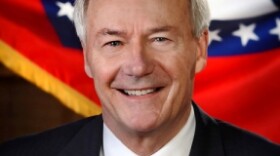A group of five legislators was meeting Monday to prepare an alternative to the managed care bill supported by Gov. Asa Hutchinson.
Rep. Michelle Gray, R-Melbourne, said the group’s bill would create DiamondCare, a model where a private company would administer parts of the Medicaid program with incentives for cost-effective care.
Legislators will gather April 6 in a special session devoted to health care. Among the topics will be Arkansas Works, Hutchinson’s successor to the private option, the program that uses Medicaid dollars to purchase private health insurance for Arkansans with incomes above 138% of the federal poverty level.
Hutchinson also is supporting a second bill, the Arkansas Medicaid Reform Act of 2016, which would create a managed care system in Medicaid for individuals with developmental disabilities, those receiving behavioral health services, and all dental services.
In that model, a private company or companies would manage parts of the Medicaid program under contract with the Department of Human Services, receiving a set amount per member. The vendor would make higher profits for cost-efficient care while bearing the financial burden if it fails to meet targets. Gov. Asa Hutchinson supports that model.
Gray and four other legislators will present another model, DiamondCare, where the state would contract with a private administrative services organization (ASO) to manage programs for developmentally disabled and behavioral health populations, with expected deliverables regarding patient outcomes and savings. For example, the ASO would be measured on how many patients moved to a lower level of care in a certain time frame, while a benchmark savings amount would be created for the overall program. If deliverables aren’t met, there would be a clawback on the contracted price.
Gray said an 18-page rough draft of that bill has been written, and supportive legislators were meeting Monday to consider changes. The others are Sen. Missy Irvin, R-Mountain View; Rep. Justin Boyd, R-Fort Smith; Rep. Joe Farrer, R-Austin; and Rep. Deborah Ferguson, D-West Memphis.
All except Irvin are members of a Health Reform Legislative Task Force that has been considering health care changes for the past year, and Irvin has been present at the meetings. All have private experience in the health care industry and have expressed concerns about managed care. Gray said their bill could be ready when the task force meets Tuesday. If not, it will be ready later in the week.
In a special session, the governor can limit which bills can be considered through the specificity of his call. Gray said she has been told that “our bill will not fit the call list and will more than likely not be allowed to be heard in special session, but I have not verified that with the governor’s office.” Hutchinson’s spokesman, J.R. Davis, said the call has not yet been drafted.
The governor’s preferred managed care bill, the Arkansas Medicaid Reform Act of 2016, was released to legislators last week by its sponsors, Sen. Jim Hendren, R-Gravette, and Rep. Charlie Collins, R-Fayetteville.
A four-page second bill, the Managed Fee-For-Service Act of 2016, was also released to members of the task force last week and reported on by Talk Business & Politics. It included a general framework that was similar to DiamondCare but lacked many of the elements.
Hendren said the Bureau of Legislative Research drew up both bills listing himself and Collins as co-sponsors and has produced other bills. The DiamondCare bill would replace the Managed Fee-For-Service Act. Gray and Irvin will be the DiamondCare bill’s primary sponsors.
Hendren said he and Collins are asking for sponsors for bills other than the Arkansas Works and managed care bills, which they will carry.
Gray said about 10 bills have been circulated. Some included elements that were similar to the DiamondCare recommendations. Her group is considering including those elements in its draft bill, or it may vote on those elements separately.
The governor’s preferred managed care bill would include all Medicaid dental services. Gray said her group agrees that dental services should be administered through managed care.
“I think it’s pretty much unanimous on the task force,” she said.







